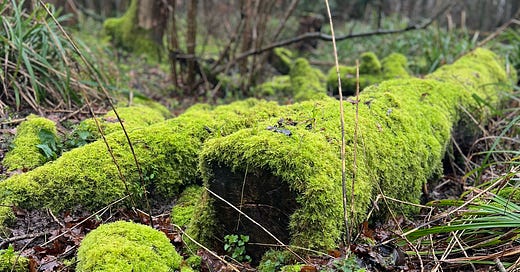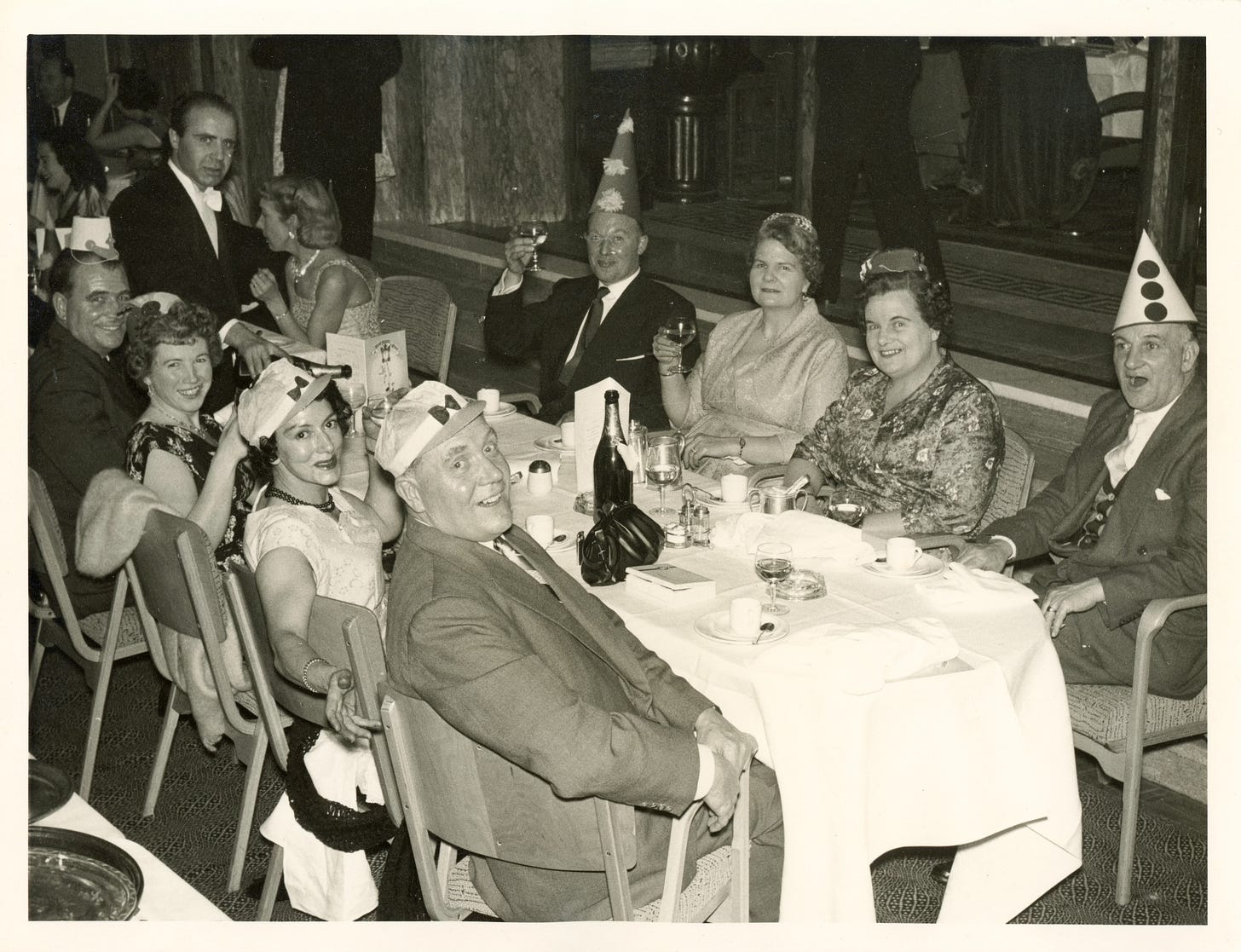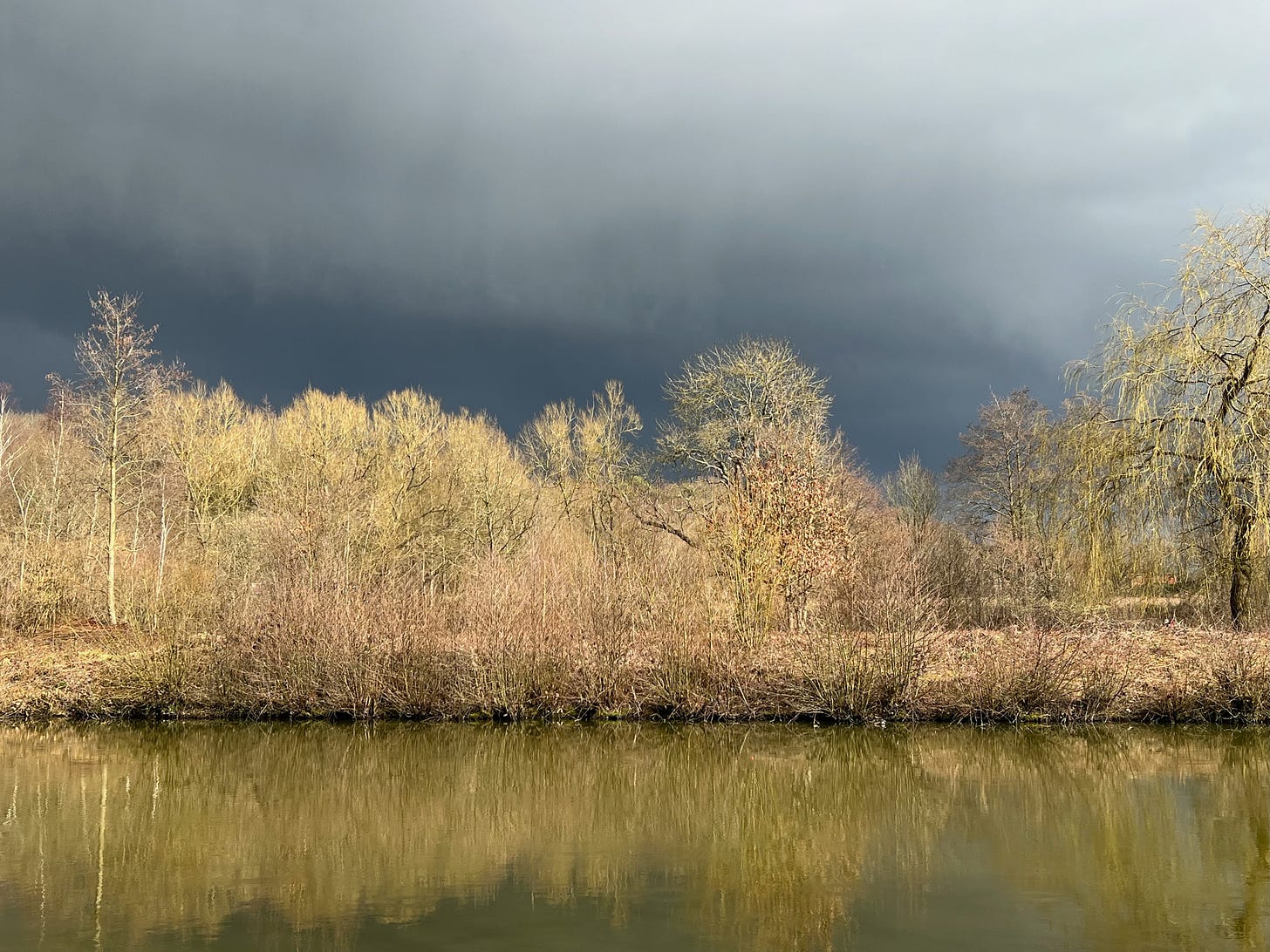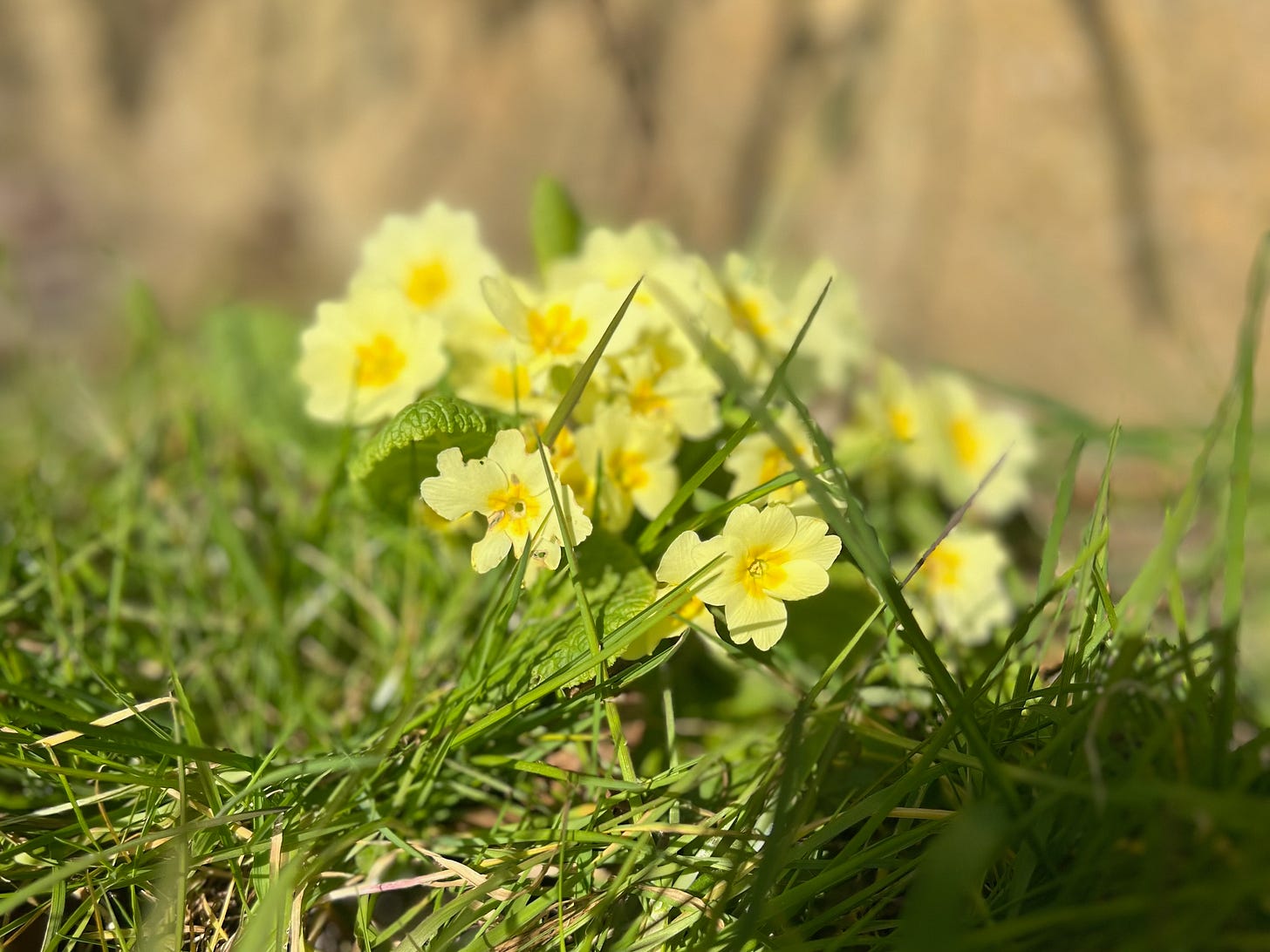Spring has finally arrived. The goldfinches are back. Everything here is bursting with energy, me included. I love Spring – explosive new growth just around the corner, everything fertile, verdant and full of possibility.
The Waggle
On the Spring equinox last year, I ran a 48-hour gathering, an experiment in curiosity called The Waggle. It was predicated on the idea that what we pay attention to changes the world we inhabit and that we should pay closer attention. It was an open invitation to unleash creativity and the brief was simply to bring to the group a 20-30 minute personal contribution of any kind – a talk, a provocation, a presentation, an art practice or performance, anything. We held the following question in mind:
“What should we attend to first?”
The metaphor of the waggle reflects our deep-rooted need for connection and belonging. And for foraging for the best resources which we invariably do best in teams. For as long as humans have been wandering around, different tribes have broken bread together and shared stories, ideas, art and craft. Sometimes congenial, sometimes challenging, these encounters are always best when lively discourse and open-minds are brought to bear.
The way I frame it, there are four moves:
Waggle - move one.
By performing the waggle dance, the honey-bee, that most wonderful and creative of creatures, communicates to its kin the precise direction and distance to the most bounteous resources. Its careful gestures are a map and compass with which to forage. Patches of nectar and pollen laden flowers, the best nesting sites, and the cleanest water, signposted.
Waggle - move two.
To golfers the waggle is an instinctive pre-takeaway move designed to release tension and to help create rhythm. It’s idiosyncratic, unique, and necessary to instigate a smooth swing. Every player has one.
Waggle - move three.
The truth is the waggle is beyond honey-bees and it’s beyond golf. All the best human encounters are full of waggle - the unfolding of artful possibility, re-connection to our souls, shared laughter and tears, aliveness, challenge. To waggle is to be thrilled.
Waggle - move four.
To accomplish extraordinary things, we need to forage with extraordinary people, in extraordinary spaces. That’s why we did it.We had a blast.
We’re going to do it again. Who’s in for the next one – likely Autumn Equinox 2025?
Re-framing
I think re-framing things always helps in finding clarity when we’re stuck. When we draw different frames around dominant assumptions, when we question our beliefs and ask more interesting questions, new pathways come into view. One of the primary dividends that comes from insatiable curiosity is emergence – new ‘wholes’ appearing without having been explicitly programmed or directed. New, colourful, dynamic patterns coming into focus over and over again. Whilst the outcomes are often unpredictable, their self-organising nature feels like getting a free go with something potentially wonderful.
Let’s be honest, real transformation doesn’t come from polite, careful, incremental change, but from bold, brave shifts of perception, perspective, and beliefs. From relentless curiosity. From maverick thinking and actions. These are the things that trigger meaningful, positive, impactful change.
In today’s business environment the most significant opportunities and threats don’t fit neatly into traditional categories. They exist outside business-as-usual, at the edges and intersections, in the blind spots, and beyond the horizon of conventional thinking.
Resolving the relentless challenges in our lives and businesses needs unconventional approaches. I believe the most important skill of all, as I have said time and time again, is curiosity. It’s in seeing the unseen. Seeing around corners. All the trials and tribulations, the failures and successes, of a long career in real estate development, has proved that to me. Navigating through the complexity of it all has left clues along with the scars.
Those that survive and thrive in the middle of all this unfolding drama, will be those who are unbound by convention. It won’t be those who build bland, monolithic teams weighed down by bureaucracy, or playing nice and safe, quietly at the back, but those who get lean, adaptable, brave and truly creative.
With all that in mind, I’ve started a new business to help others uncover the hidden potential and untapped possibilities that conventional approaches to business strategy continually miss. Born out of thirty-seven years of imagining, designing and implementing the transformation of redundant land and buildings, the challenge of using all that learning to help re-shape how other businesses transform themselves is too exciting and too important to pass up.
Tectonic Works will offer a fundamentally different practice to the standard consulting, advisory or agency playbook. At Tectonic we leverage the compounded wisdom of deeply experienced, world-class, cross-domain experts. We substitute reliance on historic data sets, trend forecasting and industry benchmarks, with radical curiosity and fresh, creative, and future-focused thinking.
At every step of the way we will bring open-mindedness and humility. Finding the magic that generates uncommon solutions means looking in uncommon places and replacing status-quo thinking with imagination and courage.
We have assembled a crack team of what I call the Wild Geese named after Søren Kierkegaard's "Wild Geese" parable about the tension between individuality and conformity. (In the parable, Kierkegaard observes how free flying wild geese can become domesticated and lose their natural wildness if they are tempted to hang out for too long with the domesticated farmyard geese. Over time, the wild geese begin to resemble the domesticated ones - growing fatter, flying less often, and losing their instinct to migrate - a metaphor for how people can abandon their authentic selves to conform to social expectations).
The Wild Geese - world class, cross-domain experts, leaders in their fields, folk that want to kindle roaring fires of positive impact in the world.
On any given project the Tectonic team might include:
A neuroscientist unlocking radical new insights about the human brain;
A genre-defining architect reshaping the future of urban environments;
A former elite forces military leader well versed in high-stress decision-making;
A poet capturing the hidden rhythms of human experience;
A psychologist working at the cutting edge of behaviour change;
An innovation expert currently re-designing the principles of leadership, and demonstrating how to manage the unmanageable;
An entrepreneur who has turned the highly improbable into the inevitable;
A consultant physician leading transformative improvement in healthcare outcomes.
This is about leaving pre-conceived ideas and beliefs behind. It’s time to embrace uncertainty, paradox, contradiction, and ambiguity – these are the new realities and they need to become opportunities not threats.
If you know anyone who you think might benefit from a conversation with Tectonic please pass on my contact details or forward them this newsletter. Thank you.
Note: Tectonic Works is inspired and informed by Nassim Taleb’s extraordinary work on anti-fragility, black swans and randomness. The beautiful black swan above is a resident of Sir Winston Churchill’s pool at Chartwell. Just in case you noticed that she isn’t a wild goose.
Lessons from an old school Italian restaurant No. 8
When we used to go to the Schooner Inn in Coulsdon, for Sunday lunch back in the 70’s, my father would often have to bite his lip at the quality of service. It was average at best. The scampi in a basket and the steak were pretty good, but not the service.
The problem was always the same - there was never enough staff to keep things flowing nicely.
On one occasion either my older brother or I had a whinge about the length of wait and my mother, with compassion for the poor staff who were run off their feet, pointed out how busy the restaurant was.
Dad got a knowing look from her - you know the sort - the silent code to back her up. The poor bloke was on a busman’s holiday and would almost certainly rather have been watching The Big Match from his armchair, after finishing a 3am service the night before. Passing judgement on someone else’s service would not have been high on his agenda of ‘best things to do this Sunday.’
Anyway, I remember my father’s reply like it was yesterday. He said if you want to be in the restaurant business you have to staff up as if every service is going to be properly busy. No compromise. And you create a destination that is so sought after you’re busy more often than not. Which means you should always have enough staff, and which means you’ll only have too many staff if your place is rubbish, or if service is so good things are purring.
At the Tiberio it might look like we have too many staff he said, because we always strive for service to be purring, even if there are numerous problems behind the scenes. Which there always are.
What he was talking about was what, in complex systems design, and in nature, we call ‘redundancy.’ And it seems to me we are squeezing it out of almost everything these days. It’s why customer service experiences are so routinely dreadful.
Redundancy means that there’s more than one system, organism, or entity that can provide each required function. And there’s overlap so the loss of, or decline in, one area doesn’t stress the whole system to failure. Ergo there’s a financial cost obviously. And in our cost cutting world we cut everything to the bone.
But what cost delighting your customers so that your business is truly sought after and resilient?
The Tiberio was like the lodgepole pine. When huge wildfires swept through Yellowstone National Park in the USA, in 1988, the lodgepole pine forests were able to grow back quickly because the pines have two types of cones: regular cones that release seeds in normal conditions, and special serotinous cones that are sealed shut with a resin and only open when exposed to the extreme heat of fire. This provides options for reseeding, depending on conditions. The pines grow both types of cone, even though the energy that goes into doing so is most often wasted. But the redundancy ensures the forest can still recover in the rare cases after fire when only a small number need to germinate.
Redundancy worked for the Tiberio like it works for the lodgepole pine. It will almost certainly work for your business as well. Whenever I hear designers or engineers talk about how clever we are at solving problems I’m minded to quote the mother of biomimicry, Janine Benyus:
“Imagine designing Spring.”
Peter Gabriel stole my bicycle
(For Sîan)
He said I have nothing to say
He said I have nothing to say
He said I have nothing to say
She said you have so much to say
***
He said it’s quite painful to say
He said it’s more painful to say
He said it’s too painful to say
She said I know love, yes I know
***
He said the brown river is cold
She said yes, only ten degrees
He said the cold water is brown
She said yes, it’s wonderfully brown
***
He said do you know Peter Gabriel stole my bicycle?
She said I did not
He said do you know Peter Gabriel stole my bicycle and rode it around in my head
She said he has a tendency to do these things
***
He said you know it’s quite painful to say
She said what’s quite painful to say, love?
He said you know it’s quite painful to say:
That Peter Gabriel stole your bicycle and rode it around in your head for so long
***
She said did he like riding your bike?
He said he told me he thought it was great
He said it suited him fine
She said I know love, I know
***
He said, I mean seriously what a fucking liberty stealing my bike and riding it around in my head for so long
She said he has a tendency to do these things
Peter Gabriel stole my bicycle, he cried
She said I think it’s time to steal it back love, don’t you?
***
People who’ve been wonderful this week
Thank you John Granholm for two and a half of the most wonderful hours at my new favourite restaurant in the West End – Lurra – spectacularly good Galician food and great service. And thank you for not running Prince over. And thank you for sending me this from Shel Silverstein:
UNDERFACE
Underneath my outside face
There's a face that none can see.
A little less smiley,
A little less sure,
But a whole lot more like me.
Thank you Scott Murdoch for revealing the unknown joy that is Lurra and to you and Dan Cunningham for making me laugh so much my face hurt.
Some final thoughts for the week
Wrong
In art, just as in Zen, there’s no such thing as wrong. The best artists know this and that’s why their performances are routinely electric. They let go and accept that whatever they put into the world is a gift. All we can do with any creative offering, whether it’s art, craft, leadership or personal relationships, is let things unfold.
“It’s not the note you play that’s the wrong note - it’s the note you play afterwards that makes it right or wrong.”
Miles Davis
Caring
We have to take better care of each other. One way or another we have to generate more positive impact in the world. Things are getting so hard, so many are suffering, so often in silence. Here’s the wonderful Zen teacher Joan Sutherland, let’s take her advice:
“So take good care of each other. May you find refuge, again and again, in the shelter of this world, and may you offer that shelter to others. And when you’re caring fiercely about the world, remember that caring opens our hearts, it makes us vulnerable. It can be a lonely thing to do on your own. So, care in groups. Finding people who care about the same things you do is one of the places in our lives the sweetness and the fierceness come together, and it’s more precious than rubies.”
Character and reputation
A friend and I were talking about great coaches a couple of days ago. He was making a strong case for Jose Mourinho having just watched the great 2020 series about coaching on Netflix called The Playbook. It’s excellent, I recommend it. We got talking about character and reputation and I dug up something John Wooden said:
"Be more concerned with your character than your reputation, because your character is what you really are, while your reputation is merely what others think you are."
John Wooden was the legendary UCLA basketball coach and English teacher between 1948 and 1975, and is regarded by many as the best coach of all time. He died in June 2010 aged 99. Over 27 years at UCLA he won 620 games, including 88 straight during one historic stretch. He finished with a record of 620-147. He won 10 NCAA national championships in a 12-year period including 7 in a row. His overall mark as a college coach was 885-203, a 0.813 winning percentage, that remains unequalled.
Most importantly as far as I’m concerned, he was committed to his boys far more than he was to personal glory or gain. During the period of extraordinary success he enjoyed at UCLA he reputedly never earned more than $35,000 a year and never asked for a raise. The Los Angeles Lakers offered Wooden their head coaching job at a salary more than 10 times what he was making, but he refused more than once. He was very clear about what he believed in, and he lived it.
John Wooden defined success as:
“Piece of mind attained only through the self-satisfaction of knowing you made the effort to do the best of which you were capable.”
His approach to coaching was built on a code of ethics learned from his father as a young man growing up during the 1930’s and 1940’s. You should never try to be better than anyone else his father told him, just be the best you can be.
He had what we might call a rather old fashioned attitude to team discipline based on four principles: 1. Never be late; 2. Be neat and clean; 3. No profanity; 4. Never criticise a team-mate.
Coach Wooden talked of belief rather than hope. “Do the things that are necessary” he said. He expected his players to give their all, and crucially he believed that you can win when you have been outscored and that you can outscore an opponent but not emerge as a winner. He was a man of great humility and wisdom. Calm and dignified.
In a world which increasingly promotes and lionises the idea of self-promotion and enhancing one’s personal reputation, I love Coach Wooden’s exhortation to be concerned only with character. Perhaps Jose could learn something from him.
Thanks for being here. Thank you for your time. Thanks for the encouragement. Please email me to keep the conversations flowing: carlo@carlonavato.com.










There is so much here to explore, Carlo, that for the now, I will focus on only two of them:
The 'waggle' - however we constitute it - is everything. Path-finding, way-finding, relatiionship and trust building, co-creation, love, Art...in my not entirely humble experience, none of these things happens in predictable, linear fashion. We have to dance - with our tribe, our environment, reality itself - and pay attention as all of those are reaching a hand back to dance with us.
The other - again, this is just for now! - is the theme of redundancy. (Although I know this is some waggle in there too!) In designing for maximum efficiency - and therefore rooting out "needless" redundancy, we not only subvert all of the possibilities for dancing as in the last paragraph, at least as importantly, we crappify our work, making it barely good enough (Applebee's, anyone?) rather than delightful and sought after like your father's Tiberio.